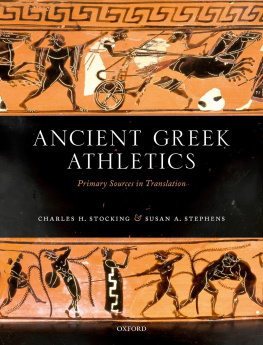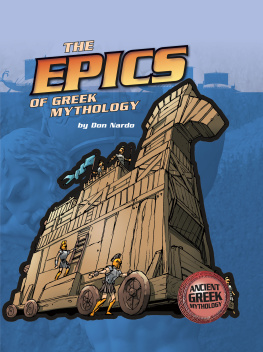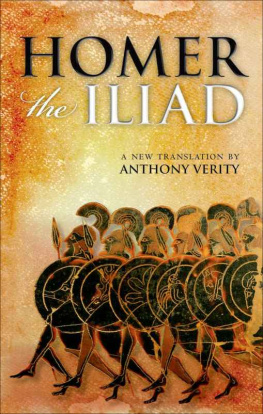OKLAHOMA SERIES IN CLASSICAL CULTURE
Ellen Greene, Series Editor
ACTS OF COMPASSION IN GREEK TRAGIC DRAMA
James Franklin Johnson
UNIVERSITY OF OKLAHOMA PRESS
NORMAN

2800 Venture Drive
Norman, Oklahoma 73069
www.oupress.com
Copyright 2016 by the University of Oklahoma Press, Norman, Publishing Division of the University. Manufactured in the U.S.A.
All rights reserved. No part of this publication may be reproduced, stored in a retrieval system, or transmitted, in any form or by any means, electronic, mechanical, photocopying, recording, or otherwiseexcept as permitted under Section 107 or 108 of the United States Copyright Actwithout the prior permission of the University of Oklahoma Press.
For information about permission to reproduce selections from this book, write to Permissions, University of Oklahoma Press, 2800 Venture Drive, Norman, Oklahoma 73069 or email .
ISBN 978-0-8061-5166-3 (hardcover : alk. paper)
ISBN 978-0-8061-5491-6 (ebook : mobipocket)
ISBN 978-0-8061-5492-3 (ebook : epub)
Acts of Compassion in Greek Tragic Drama is Volume 53 in the Oklahoma Series in Classical Culture.
This eBook was converted from the original source file by a third-party vendor. Readers who notice any formatting, textual, or readability issues are encouraged to contact the publisher at .
CONTENTS
INTRODUCTION
.
For one kindness always engenders another.
Sophokles, Aias 522
Like the ancient Greeks, we live in a world that continues to be rife with devastating and disastrous wars, violent struggles for power, and refugees in desperate flight. Unlike the ancients, in contemporary Western culture most of us witness these overwhelmingly cruel events from a distance on our televisions and through print and other nonprint media, though some Western citizens, such as soldiers and international aid workers, do become involved more directly. Along with great natural disasters, horrific accidents, plagues, and fatal diseases, these events have brought home to the world at large the realization that human life is fragile and subject to devastating loss and misfortune. Many people around the world have responded to large-scale disastrous occurrences with an outpouring of aid, both physical and monetary. Some have provided compassionate responses by personally helping in the wake of catastrophic events. Such responses remind us all how widespread and nearly universal is the potential for compassionate response in the human psyche. At the same time, we see that such compassionate responses have limits and are hard to sustain over a long period of time. Also, we recognize that the world we inhabit is not always a place of peace and harmony: distrust and conflicts continue to develop and persist between individuals, groups, ethnicities, and nations. Sometimes, perhaps even often, we fail to display an appropriate compassionate understanding and response to the suffering we witness in our human relationshipsboth between and even within our social groups: families, communities, and nations. Still, it is likely that manyif not mosthuman beings on our planet today do feel and show compassion in their daily lives. Furthermore, the existence of peacemaking and disaster-assistance institutions, and the stories we hear of compassionate individuals coming to the rescue of fellow humans in extreme circumstances, are reassuring and suggest that human beings are at least capable of responding compassionately when confronted with misfortune and suffering.
Many of us attribute our compassionate responses to great natural disasters and other catastrophic misfortunes to values that stem from our religious faith or from philosophical assumptions about life and humanityabout the human condition, if you will. The traditional stories or myths of many cultures include tales of compassionate treatment and assistance. The story of the Good Samaritan is one such story from the Christian tradition, but virtually all other cultures and religious traditions have comparable myths or archetypal narratives portraying compassionate responses to misfortune and suffering. Scholars who study ancient religions and ancient cultures from the perspectives of anthropology or other comparative disciplines have concluded that the compassionate response to the helpless person in dire need, especially to infants or other children in such situations, is practically a human givenor, at least, is something basic to the survival of human culture and human society.
For an ancient Athenian citizen of the fifth century BCE, lessons concerning the need for compassion and the proper application of compassionate assistance could be learned not only from teachers and from philosophers one might encounter in the agora or elsewhere, but also from the tragic dramas performed each spring in the Theater of Dionysos. Those dramas presented great tragic conflicts and serious tales about human vulnerability and fate. The saga of a great hero such as Oidipous or Philoktetes was a drama In that chapter (14152) we also challenged Platos negative view of the tragic emotions.
The goal of this study is to extend that smaller study through a more comprehensive analysis and interpretation of the representation of compassion and compassionate action in ancient Greek tragic drama. In the pages that follow, I examine appeals for compassion and the display or lack of compassion as they are depicted in Greek tragedy. This approach differs from the more common interpretive approach to pity in tragic drama. That approach derives in large part from Aristotles linking of pity and fear (eleos kai phobos) as the primary emotional effects produced in the spectator by the enactment of tragic drama. Furthermore, it focuses on the emotional response of the spectator/reader to the fictional representation of suffering in tragic drama, a primarily aesthetic or educational response. This kind of response differs greatly from the one we have in life when directly confronted with the suffering of another human being. If that human being appeals to us for assistance or relief of that suffering, our experience differs even more from that of Aristotles theatrical spectator. This type of interactionthat of one human being responding to another human beings perceived or expressed need, rather than that of a spectator responding to the poets fictional representation of human misfortuneis what I seek to analyze in Greek tragic drama.
I will, thereforesomewhat like Aristotles spectator, perhapsexamine representations of suffering or misfortune in tragedy, but I will also look closely at the representation of the champion or other person on stage who responds or fails to respond to that suffering, as though he or she and the sufferer represented real people. The sort of compassion that I find in tragic characters who show compassion or are asked to show compassion should be It should not, however, be exactly like the pity or compassion that we experience or expect to experience in real life today. One difference that will become obvious is the cultural difference: the characters of tragedy are products of Athenian culture in the fifth century BCE; therefore, the experiences they are represented as having to some extent reflect features of compassion as experienced in that time and place.
A second difference relates to the tragic genre and its medium: we must not forget that the persons we are examining are dramatic characters in a tragedy rather than real people; we therefore can expect them to display some emotions and actions that the average Athenian spectator would be unlikely to exhibit in real-life situations. This is especially likely to be true, since they represent ideal or heroic types rather than normal, everyday types of people. Traditional criticism of classical Greek drama has made this kind of distinction by contrasting tragedy with the other major dramatic genre, comedy. Aristophanes characters are said to typically represent average Athenian men and women in contrast to the heroes whom Aischylos and Sophokles, in particular, depicted in their tragic plays. We therefore would expect a heroic character in a play by Aischylos or Sophokles to express emotions of compassion or its contrary in accordance with the Greek audiences expectations of heroic characters.
Next page










